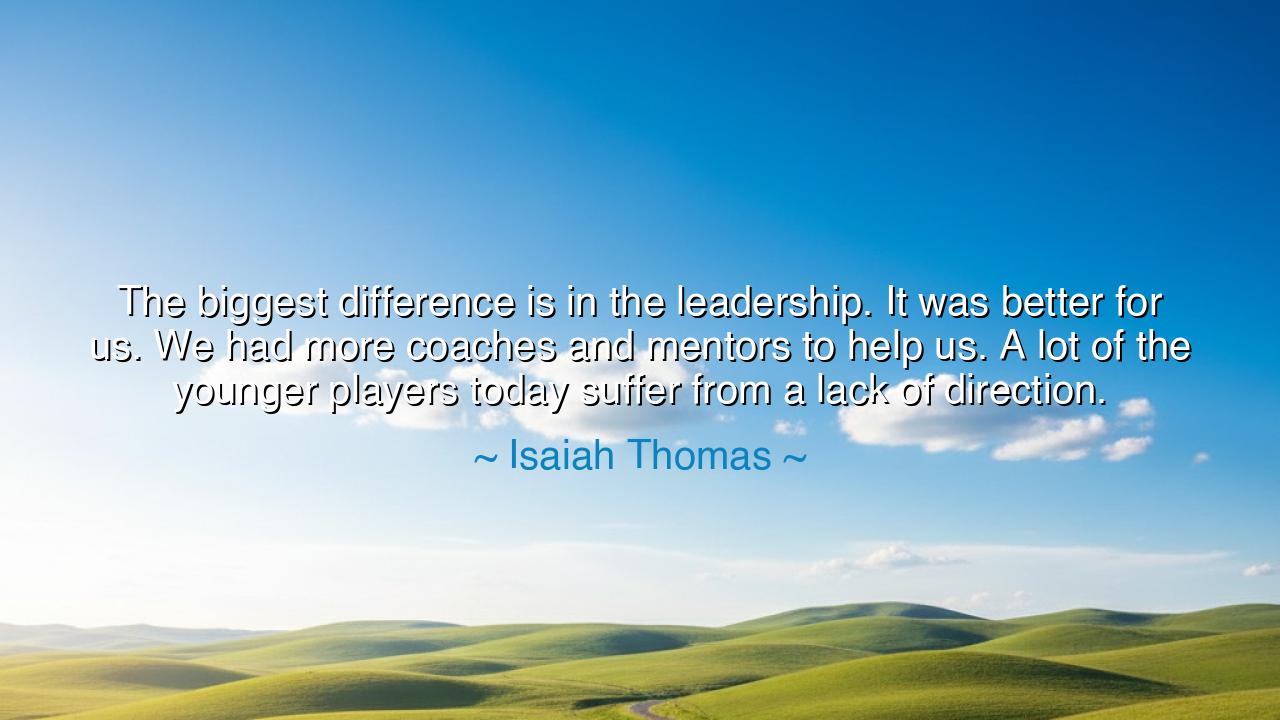
The biggest difference is in the leadership. It was better for
The biggest difference is in the leadership. It was better for us. We had more coaches and mentors to help us. A lot of the younger players today suffer from a lack of direction.






In the reflective words of Isaiah Thomas, we hear the lament of a warrior who has seen the tides of time reshape the battlefield: “The biggest difference is in the leadership. It was better for us. We had more coaches and mentors to help us. A lot of the younger players today suffer from a lack of direction.” This is not merely a comment on the game of basketball — it is a meditation on guidance, discipline, and the fading art of mentorship in an age of self-centered pursuit. Thomas, who once led the Detroit Pistons through wars of will and glory, speaks as one who understands that talent alone is never enough; without leadership, brilliance burns out, and potential is wasted in the noise of ego. His words echo the wisdom of the ancients: that the greatness of a generation depends not on its gifts, but on the guidance that shapes those gifts toward purpose.
To understand the origin of this thought, one must look to the world Isaiah Thomas came from — the NBA of the 1980s, a crucible of fierce competition and mentorship. In that era, young players were not simply taught how to win; they were molded by veterans, challenged by hard truths, and guided by coaches who were teachers in the truest sense. Thomas himself, though gifted beyond measure, was forged by the leadership of men like Chuck Daly, his legendary coach, and by the relentless brotherhood of his teammates — the “Bad Boys,” who taught one another toughness, trust, and loyalty. Through that fire, they became more than athletes; they became leaders. And so, when Thomas looks upon the modern game and sees players adrift — skilled, yet uncertain; rich, yet unanchored — he mourns not for basketball alone, but for a wider loss of mentorship in the modern world.
The ancients, too, knew the sacred bond between the mentor and the disciple. In Greece, Alexander the Great was taught by Aristotle, who not only trained his intellect but shaped his understanding of duty and humanity. In China, Confucius devoted his life to teaching rulers and youth alike that the harmony of a society rests on the moral leadership of its elders. Even in the halls of ancient Rome, the great generals and philosophers spoke of the disciplina — the passing down of wisdom through example and correction. They understood what Isaiah Thomas now reminds us: that no man becomes great in isolation. Without teachers, leaders, and guides, the young become like ships without rudders — swift, but directionless, carried wherever the winds of impulse may blow.
There is an old saying: “One generation plants the trees, another sits in their shade.” Thomas’s reflection reminds us that when the older generation fails to plant — fails to mentor, to correct, to nurture — the younger one is left wandering in the heat. His words are not a condemnation of youth, but a plea to the elders. For he remembers the gift he received — the stern words of coaches who cared enough to be honest, the wisdom of teammates who demanded accountability, the example of leaders who taught not through speeches, but through sacrifice. It was this structure of leadership that made champions of ordinary men. And where such structure decays, chaos follows, not only in sport, but in every craft and community.
History offers many mirrors for this truth. Consider the fall of the Roman legions. Once the most disciplined army in the world, they crumbled when leadership became corrupt and mentorship gave way to ambition. The soldiers remained skilled, but their spirit dissolved — they no longer fought for a cause greater than themselves. The same can be said of any society, team, or generation that forgets the importance of guidance. Skill without wisdom becomes recklessness; freedom without direction becomes folly. Thomas’s observation is thus more than nostalgia — it is prophecy. He warns us that a generation without leaders will become a generation lost in its own brilliance, brilliant yet broken.
The meaning of his words, then, reaches beyond the court. Whether in sports, business, art, or family, the principle remains eternal: leadership is the lifeblood of growth. True leaders do not command; they cultivate. They do not seek followers, but successors. And the young, for all their energy and talent, must be humble enough to seek mentorship, to learn, to listen. For the fire of youth burns bright, but without direction it soon burns out. The wise elder tempers that fire into a steady flame — one that warms the world instead of consuming it.
The lesson we draw from Thomas’s reflection is both simple and sacred: we must restore the chain of wisdom between generations. Let the old not retreat into pride or bitterness, but share their scars and their stories. Let the young not dismiss the past, but seek the voices that have walked the hard roads before them. For leadership is not inherited — it is taught, through patience, through example, through love that demands excellence. And when that bond is strong, the future is secure.
So let us heed Isaiah Thomas’s warning not as a lament, but as a call to action. Be a mentor if you are seasoned, and a student if you are still learning. Build teams, not tribes; communities, not crowds. For the greatness of tomorrow will not come from talent alone, but from the guidance of the wise and the humility of the young. Only when those two forces unite — knowledge and direction, heart and hand — will the world once again produce not just stars, but leaders; not just players, but legends.






AAdministratorAdministrator
Welcome, honored guests. Please leave a comment, we will respond soon